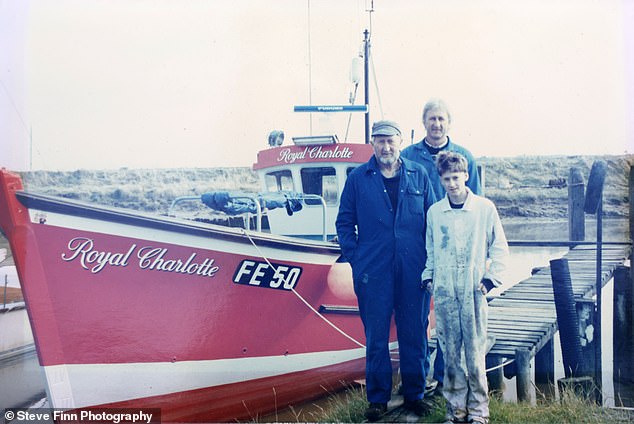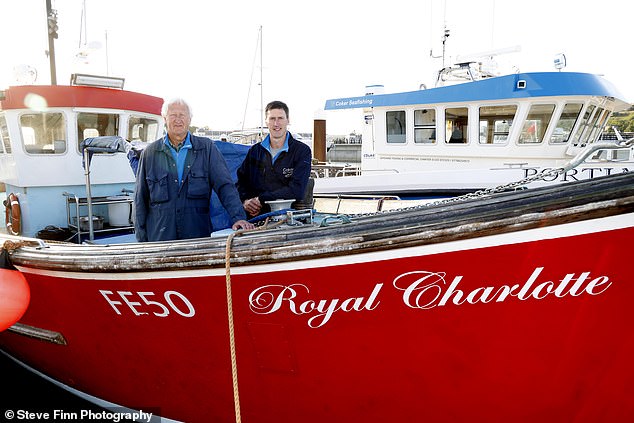In Britain’s fishing heyday, a sturdy red wooden boat called Royal Charlotte ploughed the English Channel to bring home enormous catches of cod for her owners, the Coker family.
Forty years ago, the nation’s favourite white fish was caught every day by Kent fishermen with a rod and line.
This week, the Cokers proudly showed the Mail newspaper cuttings revealing the astonishing numbers of cod they landed. One article from 1983 said the Royal Charlotte brought home 238 of the fish in one morning. Two caught during the four-hour trip, weighed 30lb each.
‘It was easy to catch cod,’ said 73-year-old Mickie Coker, as we sat together in the wheelhouse of that same Royal Charlotte in Dover harbour on Thursday evening. ‘Now the species is near extinction because of plundering by the foreign EU vessels.
‘Tomorrow I will skipper the Royal Charlotte with eight tourists who are keen sea fishermen. We will not bring back any cod because there are none left,’ he added with a tinge of anger. Instead, the group hope to catch bass and mackerel, which are somehow surviving the onslaught from the EU trawlers.
‘Last year, we caught just one cod,’ said Mickie. ‘I never thought such a disaster could happen in my lifetime, and I’ve been fishing here on Kent’s coast since I was 14. There are so few cod in the English Channel, that they can’t find other fish to breed with.
‘It takes two to tango. Those that survive are swimming around all alone looking for a mate who isn’t there’.
Mickie and his son Matt, 45, who together run a pleasure fishing business out of Dover, are reeling from what they – and many of Britain’s other remaining professional fishermen – believe is a massive betrayal by the Labour Government and Sir Keir Starmer.

From left, Jim, Mickie and Matt Coker with their boat in the 1990s

Mickie and Matt, explained this week: ‘The European trawlers have a mindset that is different to our own fishermen. They think if we can’t catch it today, someone else will. So, they carry on in one place until they kill the lot, then move on.’
This week, the PM signed a deal with the EU which Nigel Farage and his rising Reform Party
predicted will finally ‘kill off the British fishing industry’.
The Tories condemned the new pact as a total ‘surrender’ to the French, Dutch, Danish and Belgian trawler fleets.
At a stroke, the Prime Minister handed foreign fleets access to British waters for 12 more years, overriding a Brexit pact that this shared fishing deal should end next June.
The Brexit pledge was that in 2026 the UK would be handed back total control of her waters.
As the Spectator magazine commented this week: ‘Every fish caught by a foreign fishing boat is one that can’t be landed, processed and sold by British fishermen. EU vessels are also heavily subsidised by Brussels, meaning they can operate at lower costs compared to our smaller, family-run firms.
‘Fish in British waters are our country’s resource. Foreign fishermen have little interest in ensuring our stocks remain at sustainable levels. Why would they?’
The lopsided EU rules have for years allowed a foreign free-for-all. They have forced strict quotas on catches by UK boats.
Magnificent fleets in coastal towns, such as Grimsby and Folkestone, have dwindled to single figures, and it has been the same story around Britain. EU admirers say the industry represents a tiny 0.03 per cent of GDP. That means that for every £1,000 of our economic output, around 30p comes from fishing or fish farming. But fishing is a traditional part of British life that is more important than the money it brings in.
The French, the Dutch, the Belgians are sending out supertrawlers with mile-wide metal nets weighted down to scrape the seabed. This kills vast quantities of marine life and huge numbers of fish. The supertrawlers pack the thousands they catch on board, and take them straight back to Europe in boxes to be sold.
By raking over the seabed and cold-water corals, this industrial fishing has wreaked devastating environmental damage to delicate eco-systems.
English fishermen say parts of the seabed in the Channel and elsewhere are now a desert where tiny maritime creatures cannot survive. Mickie and Matt, explained this week: ‘The European trawlers have a mindset that is different to our own fishermen. They think if we can’t catch it today, someone else will. So, they carry on in one place until they kill the lot, then move on.’
British governments have been criticised by fishermen for failing to protect them from what Mickie and Matt call ‘this carnage’.
Environmental group Greenpeace is unequivocal: ‘Fishers along the south and east coast of England have had their livelihoods devastated after years of unchecked industrial fishing by supertrawlers. This has depleted fishing populations leaving some local fishers with nothing left to catch.’ A few miles along the coast from Dover is Folkestone, a once-thriving port where Kent’s most famous fish and chip shop, Sandy’s, is run on the seafront by 31-year-old Giorgio Krousti.
When I popped in, Giorgio told me the only cod he can get these days is not from Kent’s once-rich waters, but from Greenland or the Scottish coast.
‘Yes, we have cod and people love it,’ he explained. ‘But it is not locally caught like it used to be. My family have been in the fish and chip business for years and have 40 or 50 shops in the south of England.
‘They all have to source their cod from abroad or, occasionally, it comes from Peterhead fishing port in Scotland.’
All this a far cry from the old days for the Coker family who have fished on the Kent coast since the 1920s. Matt’s great-grandfather Ernest used nets to trawl for cod to sell commercially. But his son Jim began what is now the family business, taking hundreds of tourists a year on fishing trips aboard the Royal Charlotte, which was built for the purpose at a local yard in 1976.
Says Matt ruefully as we look through the family album of him standing by the boat with his father and grandfather as a teenager: ‘There were cod out in the Channel when this picture was taken. Now there are none.
‘They have been fished to near-extinction because of the lack of control over the foreign fishing trawlers using industrial methods to slaughter them.’
Matt continues: ‘I blame the dragging of the seabed for much of the destruction of both our fish and fishing communities.’ He and his father were hoping that next year would see the end of the pillaging by EU trawlers. ‘We had put up with what we were told were six-year interim Brexit rules to get the deal over the line,’ says Matt, rolling his eyes.
‘We had real expectations of getting control of our waters back next year because that was what was promised by the UK when it signed off the Brexit business.
‘History has shown that fish stocks can recover if they are given a chance, and we thought that would happen once the EU trawlers went away.
‘We have put up with a lot from them because we believed the promise that it would soon end.
‘Now the EU has suddenly been given another 12 years to carry on just the same. We feel betrayed.’
Matt has a ten-year-old son who loves going out with his father and grandad on the Royal Charlotte. ‘He likes fishing and everything about it,’ says Matt.
‘But whether he will become a fisherman like his ancestors before him is another matter.
‘He may never get the chance because there really might not be any fish left in the Channel when he grows up.’
Sad words not only for this family with a heritage steeped in fishing, but also for one of the most ancient traditions of our island nation.












